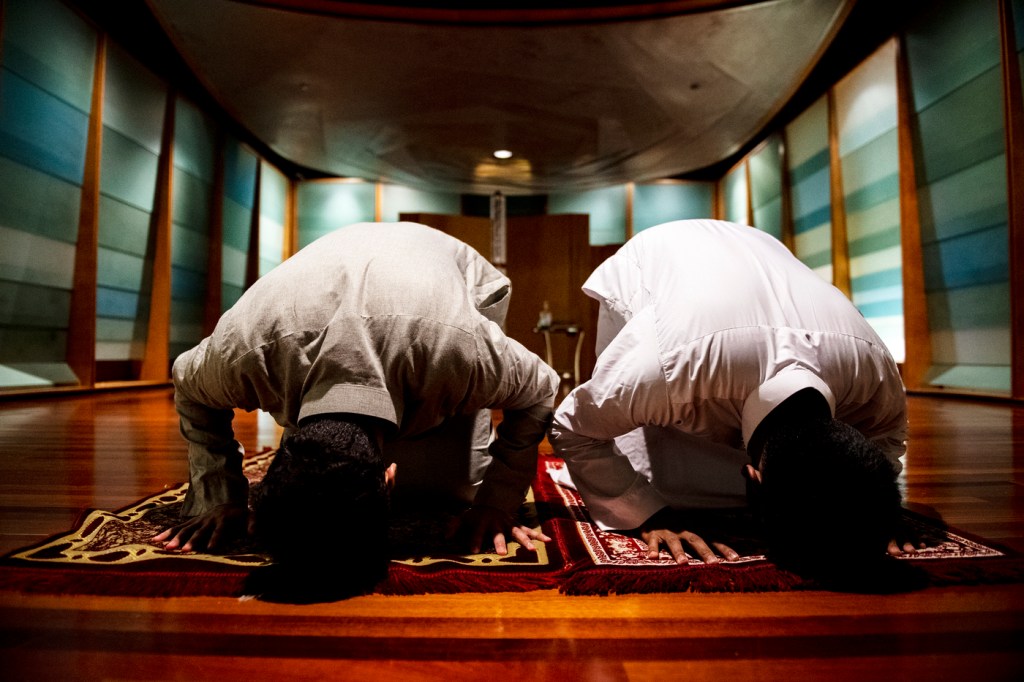‘It feels like our homes.’ Northeastern programs, meals and events bring Muslim community together during Ramadan

Though Muslim students may not be able to eat with their families across the globe during Ramadan, leaders of the Islamic Society of Northeastern University say Northeastern offers places to worship, meal programs, campus events and shuttles to a Boston Islamic center to make them feel more at home.
“Ramadan is the month of friendship and kindness and a way for us to bring all together, have meals together and pray together,” says Sara Shaikh, a social justice chair of the Islamic Society.
The Islamic Society hosts a community Iftar program twice per week with a capacity of more than 200 people for students from all colleges on campus.
“Everyone comes together during this iftar program and it feels like our homes,” says Nihal Chaudhary, a third-year behavioral neuroscience student who serves as co-president of the Islamic Society. “Ramadan really means reconnecting spiritually as well as giving back to our community especially by bringing the community together and bringing Muslims who may not be present throughout the rest of the year.”
The Northeastern Police Department offers a shuttle service daily for students to provide easy transportation from campus to the Islamic Community of Boston Cultural Center (ISBCC) during Ramadan.
“We’re really fortunate to have the Northeastern Police Department support to operate the Shuttle service to get the transportation needed to go to the masjid and pray,” Shaikh says.
There will be two events on campus during Ramadan. One is the Interfaith Iftar, which is a collaboration between the Center for Spiritual, Dialogue, and Service (CSDS) and the Islamic Society on Thursday, April 13, the 22nd of Ramadan.
Rida Shareif, a fourth-year student majoring in data science in business, says: “The whole purpose of this specific Iftar is to encourage non-Muslims to attend the Iftar and get an idea of what Ramadan is and what is the whole goal behind this month.”
The inter-MSA Iftar is the second special iftar, which is the Northeastern Islamic community that will be hosting students from Boston University, Boston College, Emerson College and Simmons University on Monday, April 17, the 26th of Ramadan.
“The main purpose of that is to all of us increase our consciousness, reconnect spiritually and remind ourselves why we’re doing this,” Chaudhary says.
Muslim students say they are experiencing the joy of fasting during Ramadan, the month of Qur’anic spring, God’s feast, and the seasons of mercy, forgiveness, and blessing.
“Ramadan is a chance to recharge spiritually,” says Fayez Khwaja, Muslim spiritual adviser at CSDS of Northeastern University. “It’s a chance to reconnect and actually sort of take time away from other activities and focus on spirituality.”
Islamic societies have various customs and traditions such as iftar parties and mass ceremonies, cleaning of mosques and religious places, reconciliation ceremonies and baking of sweets and foods for the month of Ramadan.
Ramadan is a chance to have a spiritual cleanse to get closer to Allah and people and to practice the religion to change habits in a good way, to be kinder and help people in every possible way.
“There is also an encouragement to fast with your character. To avoid bad characters and should not by practicing our faiths make it necessary to harass others while engaged in fasting from physical foods,” Khwaja says.
Muslim students say the Islamic community is pleased with recent access to spaces on campus for prayers and Islamic meetings.
Chaudhary says the university tries to incorporate as many programs and opportunities as possible to make sure the community feels at home and can keep the Ramadan spirit alive.
“Northeastern really supported the creation of dedicated spaces for Muslims on campus,” Shareif says.
This past year, there has been a lot of talk about not having a lot of halal meat in the dining halls on campus. There are a lot of Muslims who have meal plans, and it’s really frustrating that they cannot eat most of the foods. But this year the dining halls in the Northeastern at the request of the Islamic Society get more options with halal meat on their menus, Shaikh said.
“The dining halls are really trying to up their plans in terms of trying to provide more halal food options for Muslims and accommodating as much as they can,” Shareif says.






